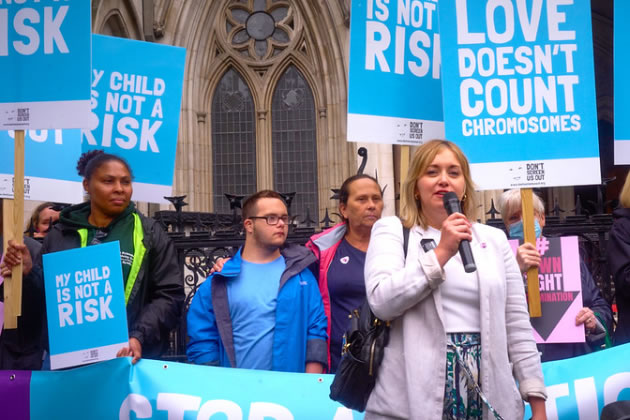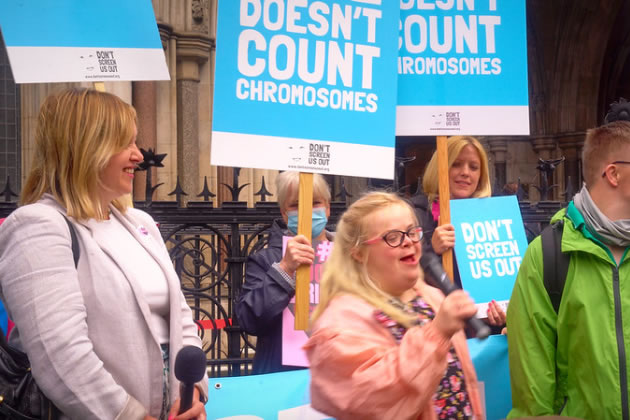Brentford Woman Takes Down's Syndrome Fight to Europe
Máire Lea-Wilson wants 'discriminatory' UK law overturned

Maire Lea-Wilson outside the Royal Courts of Justice
May 19, 2023
A Brentford woman is taking the UK government to European Court of Human Rights over the issue of the abortion law which she says discriminates against people with Down’s syndrome.
Máire Lea-Wilson has joined with Heidi Crowter, a 27-year-old woman from Coventry who has Down’s syndrome, to challenge the current legislation in the UK which allows abortion up to birth for Down’s syndrome. They want the European Court to overrule a decision by two judges at the Court of Appeal which said that the law was not discriminatory.
Maire first became aware of the way the law worked when she was 34 weeks pregnant and was informed that her son had Down’s Syndrome. She says she was offered an abortion three times with medical staff stressing how burdensome caring for a child with the condition might be.
She carried the child to term and now Aidan is three years old and, she says, is very much the equal of his older brother.
Maire and Heidi are hoping that the court could find the UK’s current disability abortion law to be in violation of human rights, which could not only have implications for the United Kingdom but also set a legal precedent for all forty six countries that are members of the Council of Europe. The countries have a total combined population of over 700 million people. The UN Committee on the Rights of Persons with Disabilities has consistently criticised countries that provide for abortion on the basis of disability and has recommended that the UK change its laws.

Heidi Crowter makes the case against current UK law
Currently in England, Wales and Scotland, there is a general 24-week time limit for abortion, but if the baby has a disability, including Down’s syndrome, cleft lip and club foot, abortion is legal right up to birth.
There were 3,370 disability-selective abortions in 2021, a 9% increase from 3,083 in 2020. The number of late-term abortions at 24 weeks gestation or over where the baby has a disability increased by 20% from 229 to 274.
There were 859 abortions where a baby had Down’s syndrome in 2021, an increase of 24% from 2020, 24 of which were aborted after 24 weeks a 71% increase on the previous year.
The 2013 Parliamentary Inquiry into Abortion for Disability found the vast majority of those who gave evidence believed allowing abortion up to birth on the grounds of disability is discriminatory, contrary to the spirit of the Equality Act 2010 and that it affects wider public attitudes towards discrimination. Polling has shown that the majority of people in England, Wales and Scotland feel that disability should not be grounds for abortion at all, with only one in three people thinking it is acceptable to ban abortion for gender or race but allow it for disability.
Heidi, Maire and their legal team have set up a CrowdJustice crowdfunding page to help raise funds for legal proceedings, pay for legal advice and prepare for the case.
Heidi said, “I am taking my case all the way to the European Court of Human Rights at Strasbourg because it is downright discrimination that people with disabilities are treated differently.
“In 2023, we live in a society where disabled people are valued equally after birth but not in the womb.
“Our law singles out babies with disabilities. It says that babies can’t be aborted after 24-weeks if they are not found to have a disability, but if a baby is found to have Down’s syndrome, they can be aborted up until birth. This is the current law in the UK and I think it’s not fair.
“This law sends a message to people like me with Down’s syndrome that we are less valuable than others. This is not true and it is not right.”
Value Reading Articles Like This? Help Us Produce More This site remains committed to providing local community news and public interest journalism. Articles such as the one above are integral to what we do. We aim to feature as much as possible on local societies, charities based in the area, fundraising efforts by residents, community-based initiatives and even helping people find missing pets. We've always done that and won't be changing, in fact we'd like to do more. However, the readership that these stories generates is often below that needed to cover the cost of producing them. Our financial resources are limited and the local media environment is intensely competitive so there is a constraint on what we can do. We are therefore asking our readers to consider offering financial support to these efforts. Any money given will help support community and public interest news and the expansion of our coverage in this area. A suggested monthly payment is £8 but we would be grateful for any amount for instance if you think this site offers the equivalent value of a subscription to a daily printed newspaper you may wish to consider £20 per month. If neither of these amounts is suitable for you then contact info@neighbournet.com and we can set up an alternative. All payments are made through a secure web site. One-off donations are also appreciated. Choose The Amount You Wish To Contribute. If you do support us in this way we'd be interested to hear what kind of articles you would like to see more of on the site – send your suggestions to the editor. For businesses we offer the chance to be a corporate sponsor of community content on the site. For £30 plus VAT per month you will be the designated sponsor of at least one article a month with your logo appearing if supplied. If there is a specific community group or initiative you'd like to support we can make sure your sponsorship is featured on related content for a one off payment of £50 plus VAT. All payments are made through a secure web site. |
Related links
|